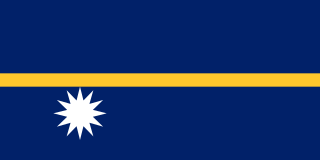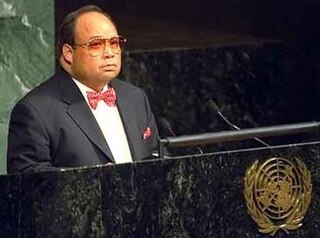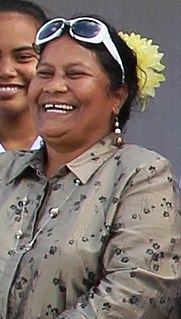Related Research Articles

Nauru, officially the Republic of Nauru and formerly known as Pleasant Island, is an island country and microstate in Oceania, in the Central Pacific. Its nearest neighbour is Banaba Island in Kiribati, 300 km (190 mi) to the east. It further lies northwest of Tuvalu, 1,300 km (810 mi) northeast of Solomon Islands, east-northeast of Papua New Guinea, southeast of the Federated States of Micronesia and south of the Marshall Islands. With only a 21 km2 (8.1 sq mi) area, Nauru is the third-smallest country in the world behind Vatican City and Monaco, making it the smallest republic as well as the smallest island nation. Its population of about 10,000 is the world's second-smallest, after Vatican City.

The history of human activity in Nauru, an island country in the Pacific Ocean, began roughly 3,000 years ago when clans settled the island.

The politics of Nauru take place in a framework of a parliamentary representative democratic republic, whereby the President of Nauru is the head of government of the executive branch. Legislative power is vested in both the government and the parliament. The Judiciary is independent of the executive and the legislature.

Ludwig Derangadage Scotty is a Nauruan politician who twice served as President of Nauru and was Speaker of Parliament five times between 2000 and 2016. He served as president from 29 May 2003 to 8 August 2003 and again from 22 July 2004 until his ousting in a vote of no confidence on 19 December 2007. He was elected as president in 2003, again from November 2010 to April 2013, and from June 2013 to June 2016.

René Reynaldo Harris was President of the Republic of Nauru four times between 1999 and 2004. He was a Member of Parliament from 1977 to 2008.
Kieren Aedogan Ankwong Keke is a Nauruan politician and medical doctor. He is a member of the Parliament of Nauru and former Minister of Finance and Minister of Foreign Affairs.
Russell Effaney Kun is a political figure from the Pacific nation of Nauru and former powerlifter.

David Waiau Adeang is a Nauruan politician, former Speaker of the Parliament of Nauru, and Nauru's Minister of Finance and Justice, as well as the Minister Assisting the President of Nauru. He is a founding member of the Naoero Amo, currently the only successful political party on the island.

Marcus Ajemada Stephen is a Nauruan politician and former sportsperson who previously was a member of the Cabinet of Nauru, and who served as President of Nauru from December 2007 to November 2011. The son of Nauruan parliamentarian Lawrence Stephen, Stephen was educated at St Bedes College and RMIT University in Victoria, Australia. Initially playing Australian rules football, he opted to pursue the sport of weightlifting, in which he represented Nauru at the Summer Olympics and Commonwealth Games between 1990 and 2002, winning seven Commonwealth gold medals.
Kennan Ranibok Adeang was a Nauruan politician who served as President of Nauru for three separate periods during the late 20th century. Born in Nauru, and educated in Australia, including at the Australian School of Pacific Administration, Adeang was first elected to the Parliament of Nauru in 1971, representing the seat of Ubenide, and became a noted opponent of Hammer DeRoburt, the country's first president. He first became president in 1986, serving two short terms at the end of that year. In the following year, 1987, Adeang was involved in the establishment of the Democratic Party of Nauru, one of the first political parties in Nauru. He again served as president in late 1996, but lost power after a motion of no confidence. Adeang was active in parliament until 2000, serving at various times in the Cabinet, and also as Speaker from February 1997 to December 1998. In 2007, he was appointed High Commissioner to the Republic of Fiji, serving in the position until his death in 2011. His son, David Adeang, also served in the Nauruan parliament, occupying the same constituency as his father.
Frederick William Pitcher is a Nauruan political figure. In December 2007, Pitcher was appointed Minister of Finance of Nauru, to serve in the Administration of President Marcus Stephen.

Nauruan nationality law is regulated by the 1968 Constitution of Nauru, as amended; the Naoero Citizenship Act of 2017, and its revisions; custom; and international agreements entered into by the Nauruan government. These laws determine who is, or is eligible to be, a national of Nauru. The legal means to acquire nationality, formal membership in a nation, differ from the domestic relationship of rights and obligations between a national and the nation, known as citizenship. Nauruan nationality is typically obtained either on the principle of jus soli, i.e. by birth in the Nauru or under the rules of jus sanguinis, i.e. by birth to parents with Nauruan nationality. It can be granted to persons with an affiliation to the country who has lived in the country for a given period of time through naturalization.
Roland Tullen Kun is a Nauruan politician and Member of Parliament.

Baron Divavesi Waqa is a Nauruan politician who was the 14th President of Nauru from 11 June 2013 until 27 August 2019. He previously served as Minister of Education from 2004 to 2007.
Topics related to Nauru include:
Nauruan law, since Nauru's independence from Australia in 1968, is derived primarily from English and Australian common law, though it also integrates indigenous customary law to a limited extent. Nauruan common law is founded mainly on statute law enacted by the Parliament of Nauru, and on precedents set by judicial interpretations of statutes, customs and prior precedents.

Charmaine Eraidinomo Scotty is a Nauruan politician who has been a Member of Parliament for Yaren since 2013. She was a cabinet minister from 2013 to 2019.
Ruby Thoma, born Ruby Dediya in 1949 in Nauru, is a Nauruan politician.

Lionel Rouwen Aingimea is a Nauruan lawyer and politician. He currently serves as the fifteenth president of Nauru.

Nauru-Taiwan relations are relations between the Republic of Nauru and Taiwan.
References
- 1 2 3 "Lawyer Gabrissa Hartman is Nauru's new Member of Parliament". Pacific Women. Retrieved 5 November 2017.
- ↑ "Nauru". Pacific Women in Politics. Retrieved 5 November 2017.
- 1 2 "Ubenide by-election 19 January 2017" (PDF). Nauru Bulletin. 26 January 2017. Retrieved 5 November 2017.
- ↑ "Nauru candidate uses banned Facebook to campaign". Radio New Zealand. 8 July 2016. Retrieved 5 November 2017.
- ↑ "Campaign interference claims dog Nauru election". Radio New Zealand. 8 July 2016. Retrieved 5 November 2017.
- ↑ "New election laws challenged". Cook Islands News. 1 June 2016.
- ↑ "REPUBLIC OF NAURU LEGISLATIVE ELECTION OF 24 AUGUST 2019". Psephos. Retrieved 22 August 2021.